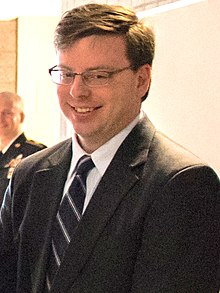런던 프로세스
London Process런던프로세스(London Process)는 2011년부터 2년마다 글로벌 사이버 컨퍼런스(Global Conference on Sypacials) 또는 GCCS라는 이름으로 열리는 복수 이해당사자 모임이다.각 GCCS 회의에서는 정부, 민간, 시민사회가 모여 사이버 공간에서의 실질적인 협력을 논의하고 촉진하며 사이버 역량 구축을 강화하고 사이버 공간에서의 책임 있는 행동에 대한 규범에 대해 논의한다.[1][2]런던 프로세스(London Process)는 2011년 뮌헨 안보회의에서 윌리엄 헤이그 영국 외무장관이 제안한 것이다.[3]
역사
제1차 회의
제1차 GCCS 회의는 2011년 11월 23일부터 24일까지 영국 외무부 주최로 런던에서 개최되었다.첫 번째 회의의 장소는 일련의 회의들에 "런던 프로세스"라는 이름을 붙이게 했다.이 첫 회의에서 700명의 참가자들 사이의 토론을 통해 "사이버공간에서의 행동 통제를 위한" 원칙이 확립되었다.[1]
제2차 회의
제2차 GCCS 회의는 2012년 10월 4일부터 5일까지 부다페스트에서 개최되었다.그동안 논의된 주제와 초점은 인터넷 권리와 인터넷 보안의 관계였다.비록 극소수의 시민사회단체들이 초청되어 연설했음에도 불구하고, 네트워킹은 가치 있었고, 행사의 결과를 대변하는 의장성명보다 더 장기적인 영향을 미쳤다.
제3차 회의
세 번째 행사는 2013년 10월 17-18일 서울에서 열렸다.이 회의는 약 1,600명의 참석자로 늘어났으며, 세계 남부 국가들의 대표성이 높아졌다.제3차 GCCS의 원칙적 성과는 보편적 인터넷 접속의 중요성을 부각시키고 오프라인에서도 동일한 권리를 보호해야 한다는 점을 강조하고, 국제법이 온라인상에서 적용가능하며 isse라는 유엔 원칙을 강화한 '개방과 보안의 서울 기본 약속'이었다.평화와 안정을 유지하고 개방적이고, 안전하고, 평화롭고, 접근하기 쉬운 ICT 환경을 촉진해야 한다.[4]
제4차 회의
제4차 GCCS 회의는 네덜란드 외무부 주관으로 헤이그에서 2015년 4월 16일부터 17일까지 세계포럼에서 열렸다.[2][1]
제5차 회의
2017년 11월 23일부터 24일까지 인도 뉴델리에서 열린 제5차 GCCS 콘퍼런스는 3500여 명이 참가했다.[1][5]GCCS 2017의 주제는 "사이버4"이다.모두: 지속가능한 발전을 위한 안전하고 포괄적인 사이버 공간"이다.그러나 더 나아가 다음 4개 섹션으로 나눌 수 있다.사이버4성장 – 개인, 중소기업, 대기업 등에 사이버 공간의 중요성이 증대됨에 따라 성장과 발전을 촉진하기 위한 아이디어와 통찰력을 공유한다.Cyber4DigitalInclusion – 디지털 아이덴티티에 대한 모범 사례, 모두를 위한 개방 및 무료 인터넷 아이디어, 다른 방식으로 활성화하기 위한 디지털 기술 등을 공유하여 포괄적인 사회를 위한 로드맵을 그린다.Cyber4Security – 포괄적인 사이버 환경을 위한 프레임워크.조직 및 국가를 위한 보안 프로토콜
사이버4외교 – 사이버 전쟁 방지를 위한 주간 협력과 글로벌 질서를 위한 사이버 외교와 같은 사이버 보안의 다양한 측면을 탐구한다.
참조
- ^ a b c d Van Horenbeeck, Maarten (8 January 2018). "FIRST at the Global Conference on Cyberspace". FIRST. Retrieved 8 July 2021.
On November 23rd and 24th, 2017, FIRST participated in the Global Conference on Cyberspace (GCCS), an Internet policy event which is part of the 'London Process', conferences where governments and the wider Internet community gather to 'discuss and promote practical cooperation in cyberspace, to enhance cyber capacity building and to discuss norms for responsible behavior in cyberspace'. The first GCCS was organized in London by the UK Foreign Office and the Delhi event marked the fifth iteration. These conferences have grown in participation from 700 in London in 2011, to 3500 in India. The conference includes governments, civil society and the technical community. The GCCS originally developed to build on the existing World Summit on Information Society (WSIS) process. In the GCCS process, each country coordinates a Chair’s statement, which does not reflect consensus, but reflects at a high level the discussion that took place over the duration of the conference. Notably, the GCCS does not develop treaties, or binding agreements, between states. Instead, the goal is to discuss sensitive and challenging topics and allow participants to develop consensus. Some GCCS have also led to more tangible outcomes. In 2015, the Netherlands launched the Global Forum on Cyber Expertise (GFCE), which has become a central body for governments and other stakeholders to work on cyber capacity building. The GFCE is a membership-based organization of 38 states, 11 inter-governmental organizations such as the African Union, Council of Europe and OSCE and 9 private sector enterprises.
- ^ a b "About the Global Conference on CyberSpace 2015". Retrieved June 28, 2015.
- ^ Bavisi, Jay. "Jay Bavisi Among the Moderators at the 5th Annual Global Conference of Cyber Space". EC Council. Retrieved 8 July 2021.
The London Process began as a conference on cyberspace hosted by the British Foreign Office following a proposal by the country's Foreign Secretary William Hague at the Munich Security conference in 2011 for an international meeting to discuss 'rules of the road' in cyberspace. The deliberation and emphasis of the London Process was to provide a cyberspace that was 'open, global, safe and secure', the specifics of which were to be developed through consensus on various principles and norms amongst the various stakeholders.
- ^
 이 문서에는 CC BY 4.0 라이센스에 따라 사용할 수 있는 텍스트가 포함되어 있다. ""What is the Global Conference on Cyberspace?" FAQs on the GCCS, The Hague, 16-17 April 2015". Retrieved June 28, 2015.
이 문서에는 CC BY 4.0 라이센스에 따라 사용할 수 있는 텍스트가 포함되어 있다. ""What is the Global Conference on Cyberspace?" FAQs on the GCCS, The Hague, 16-17 April 2015". Retrieved June 28, 2015. - ^ "Cyber4All: A Secure and Inclusive Cyberspace for Sustainable Development". Retrieved 20 March 2018.


